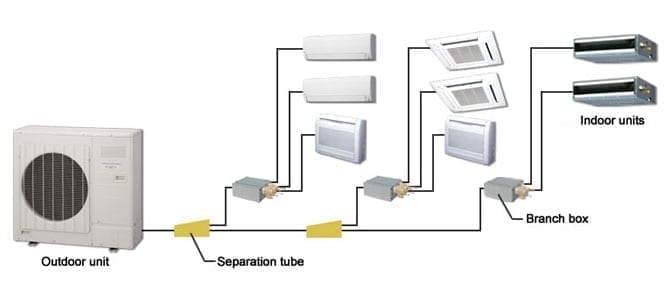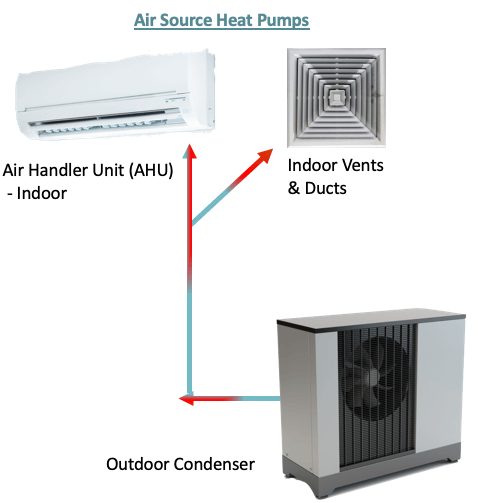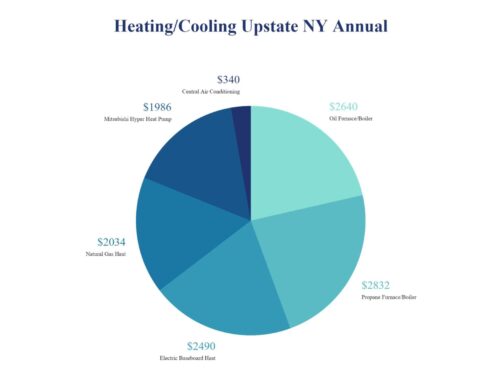
Mitsubishi Air Source Heat Pumps: Efficient Solutions for Cold Climates
Why Choose Mitsubishi Air Source Heat Pumps?
Advanced Technology
Mitsubishi’s Hyper-Heating INVERTER® (H2i®) technology ensures efficient operation in temperatures as low as -13°F, maintaining 100% capacity at 5°F.

Superior Energy Efficiency
With SEER ratings up to 26, Mitsubishi heat pumps provide significant energy savings.
Durability for Harsh Climates
Designed to withstand extreme conditions, these heat pumps offer consistent performance and longevity.
Eco-Friendly Heating
Switching to a Mitsubishi heat pump reduces greenhouse gas emissions, contributing to a greener environment.
Understanding Mitsubishi Heat Pump Costs
Unit Costs
Mitsubishi heat pumps range from $7,500 to $13,000, depending on the model and capacity.
Installation Costs
Professional installation typically costs between $500 and $2,000, depending on location and project requirements.
Total Estimated Cost: $8,000 – $15,000
Incentives for Air Source Heat Pumps in New York
Rebates
- NYS Clean Heat Program: Offers rebates ranging from $600 to $960 per ton for cold climate air-source heat pumps.
Tax Credits
- Federal Tax Credit: 30% of the cost, up to $2,000 per year, available through 2032.
- NY State Residential Tax Credit: 25% of installation costs, up to $5,000.
Financing Options
Benefits of Ductless Mini Split Heat Pumps
Flexible Installation
Requires only a small opening in the exterior wall, making it suitable for various applications.
Energy Savings
Provides targeted heating and cooling, reducing utility bills.
Versatile Applications
Ideal for room additions, garages, and workshops.
Heat Pump Installation and Labor Costs
Labor costs for installing a heat pump range from $68 to $175 per hour, with installations typically taking up to 20 hours.
Key Considerations
- Proper installation is crucial for optimal efficiency.
- Hiring experienced contractors ensures system longevity and performance.
Selecting the Right Heat Pump Size
| BTUs Needed | Room Size (Square Feet) |
|---|---|
| 6,000 BTUs | 150-250 sf |
| 9,000 BTUs | 350-400 sf |
| 12,000 BTUs | 450-550 sf |
| 24,000 BTUs | 1,500+ sf |
Multi-Zone vs. Single-Zone Systems
Single-Zone Systems
Best for single rooms or small spaces, consisting of one outdoor and one indoor unit.
Multi-Zone Systems
Ideal for whole-home heating, allowing independent temperature control for each zone, reducing energy use and costs.
How Do Air Source Heat Pumps Work?
Heat pumps transfer heat between indoor and outdoor environments, providing efficient heating in winter and cooling in summer.
Key Benefits
- Energy-efficient heating and cooling.
- Reduced reliance on fossil fuels.
- Lower greenhouse gas emissions.
Advantages of Mitsubishi Air Source Heat Pumps Over Traditional Systems
Mitsubishi air source heat pumps are not only energy-efficient but also environmentally friendly compared to traditional heating systems such as oil or gas furnaces. By leveraging advanced technology, these systems ensure optimal comfort without the high operational costs.
Energy Savings Year-Round
Unlike conventional systems, Mitsubishi heat pumps work efficiently throughout the year, providing cooling in summer and heating in winter. This dual functionality reduces the need for separate HVAC units, translating into significant savings on installation and energy costs.
Noise Reduction
Mitsubishi air source heat pumps are designed with advanced noise-dampening features, ensuring quiet operation. Homeowners can enjoy a comfortable, peaceful environment without the disruptive noise associated with traditional systems.
Common Misconceptions About Heat Pumps
Myth: Heat Pumps Don’t Work in Extreme Cold
Modern advancements in technology, such as Mitsubishi’s Hyper-Heating INVERTER® (H2i®), ensure that air source heat pumps operate efficiently even in sub-zero temperatures, making them ideal for cold climates.
Myth: Heat Pumps Are Too Expensive
While the initial cost of installation may be higher, the long-term energy savings, tax credits, and rebates significantly offset the investment. Over time, Mitsubishi heat pumps prove to be a cost-effective choice for homeowners.
How to Choose the Right HVAC Contractor
Partnering with a qualified HVAC contractor is crucial to ensuring your Mitsubishi air source heat pump operates at peak efficiency. Look for contractors who:
- Have certifications from organizations like NATE (North American Technician Excellence).
- Are experienced with Mitsubishi products and air source heat pumps.
- Provide comprehensive installation and maintenance services.
Proper installation and regular maintenance are key to maximizing the lifespan and efficiency of your heat pump system.
Long-Term Benefits of Mitsubishi Heat Pumps
Switching to a Mitsubishi air source heat pump system provides long-term advantages beyond energy efficiency. These systems contribute to increased property value, reduced environmental impact, and enhanced indoor air quality.
Improved Indoor Air Quality
Mitsubishi heat pumps come equipped with advanced filtration systems that remove allergens, dust, and other pollutants from the air, creating a healthier living environment.
Increased Home Value
Installing a modern, energy-efficient heating and cooling system like Mitsubishi’s air source heat pumps can boost your home’s market appeal, especially for eco-conscious buyers.
Key Features of Mitsubishi Air Source Heat Pumps
- Smart Controls: Easy-to-use remote and app-based controls for temperature management.
- Compact Design: Sleek, space-saving units fit seamlessly into any home design.
- Flexible Zoning: Multi-zone systems allow personalized temperature control for each room.
Save More, Stay Informed!
Sign up for our newsletter and be the first to receive:
✅ Exclusive Sales & Rebates on Mitsubishi Heat Pumps.
✅ Industry News and Expert HVAC Tips.
✅ Updates That Help You Save Energy and Money.




